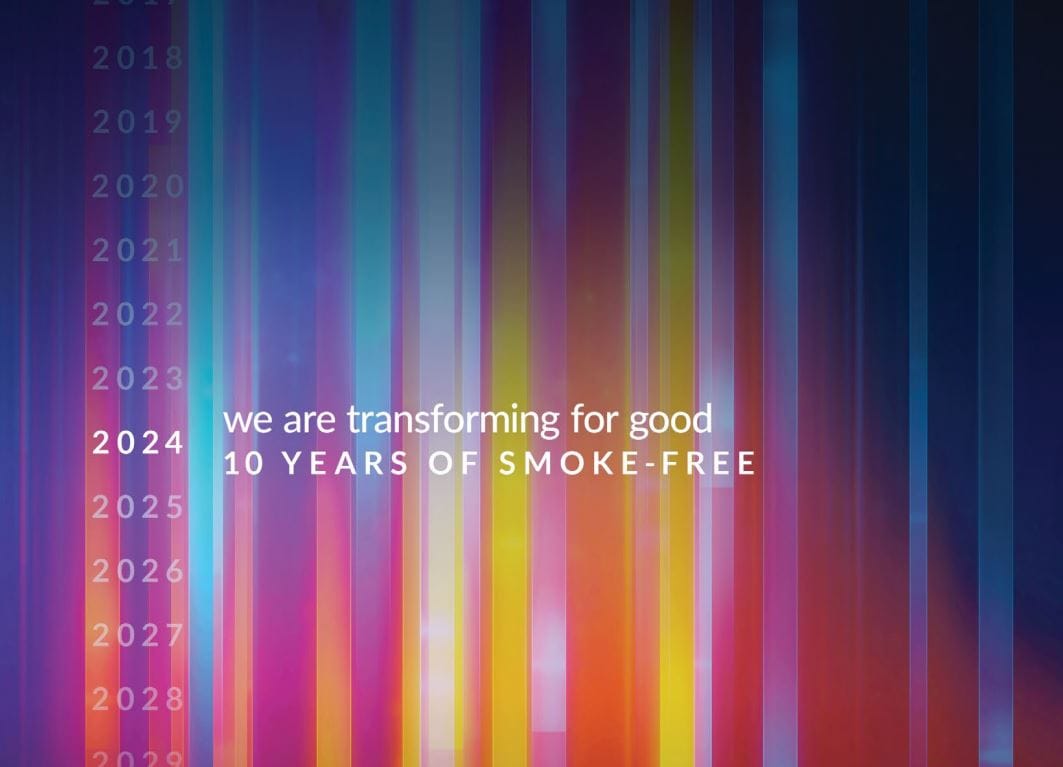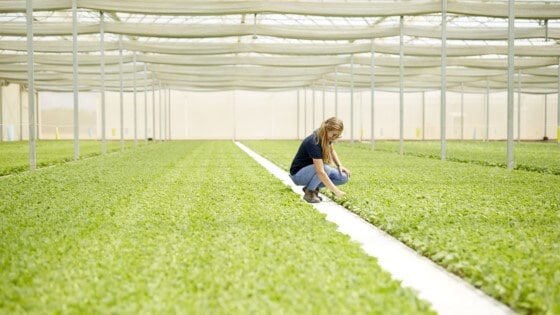What is our 2019 Integrated Report all about and why is it important?
Music starts.
Words appear on screen: Progress towards a world without cigarettes.
Philip Morris International logo.
Jennifer Motles, Director Social Impact & Sustainability Philip Morris International, speaks to camera:
Hello everyone. I'm Jenny, Director of Sustainability, and I'm here with Huub Savelkouls,
our Chief Sustainability Officer (Huub Savelkouls) to talk about some pressing questions about sustainability at PMI.
Last year we had a Sustainability Report. Why isn’t it called Sustainability Report this year?
Huub Savelkouls, Chief Sustainability Officer, Philip Morris International, talks to camera:
Because this year it's an Integrated Report.
We integrate both the financial and the non-financial information, and therefore
it's more comprehensive than just a sustainability report.
What else is new is that we publish our Statement of Purpose there,
which was already published in the proxy statement.
And we have for the first time a set of holistic targets for the year 2025.
Jennifer Motles says:
What is the link between your Statement of Purpose and our Integrated Report?
Huub Savelkouls says:
Our statement of purpose is a declaration by the board,
what the purpose of the company is and what our most
important stakeholders are, and it relates to the Integrated Report,
because the Integrated Report then explains
how we get and achieve this purpose.
and as the title of the report says, it's how are we making
progress toward the world without cigarettes?
Jenny says:
For those that do not believe that we are really
serious about our purpose, that we are serious about transforming,
how can they verify and measure progress?
Huub says:
One way for people to check how serious we are in terms of
transforming our business is to look at our business transformation metrics.
And I'll give you a couple of examples.
The metrics showed that last year,
98% of our R&D expenditure was related to smoke-free products.
71% of our commercial expenditure related to smoke-free products.
Almost 20% of our revenues came from smoke-free products.
And what I think is amazing is that already four markets
have more than 50% of our revenues coming from smoke-free products.
This shows the huge progress the company has made in only 4
or 5 years time, and I think I know of no other example
in other industries where companies have transformed this fast.
Jennifer Motles says:
So how do you define your sustainability strategy?
Huub Savelkouls says:
To define a sustainability strategy, you need to first start with the
sustainability materiality analysis, whereby we looked at what are the
topics that are most important for a company and for
society where we can make a difference.
How can we fulfill our social purpose as a company?
And this was a rigorous process with subject matter expertise involved,
but ultimately also with approval of the SMT to define what are the most
important topics that we have as a company.
And we defined 10 in the end.
It is about product health impact.
It's about access to our smoke-free products.
It's about youth smoking prevention, marketing and sales practices.
Let's say, human rights, climate, anti-littering,
Eco-design and labor practices in agriculture.
Once you have defined your most important topics,
you need to see where do you want
to go in a couple of years from now.
So we defined the ten most important topics.
And then we set what are our targets for 25 on those targets.
Jennifer Motles says:
Sustainability Report, now Integrated Report and also ESG.
What does ESG mean?
Huub Savelkouls says:
ESG stands for environmental, social and governance,
and it's the term used often in the financial world to talk about Sustainability.
And ESG is a big part of what we report on.
But I think where PMI is different is that we also report on the product.
Jenny asks:
What do you mean by the product?
Huub replies:
As a tobacco company, you cannot be serious about sustainability or ESG
if you don't also talk about the products.
So ESG is a lot about how you operate as a business,
but not so much about the product that you produce.
So the product is a key part or the core element, I would say of our strategy.
Jennifer Motles says:
What is our strategy and how is it connected to our transformation?
Huub Savelkouls says:
The key strategy for the product, of course, is replacing cigarettes.
When we developed smoke-free products many years ago,
we had a choice to make.
Are we going to offer choice to consumers
selling all products with equal, let's say, interest?
Or are we trying to replace cigarettes with
these new smoke-free products?
Jenny asks:
Can you share with us some of the highlights of what we have achieved this year, for example, on environmental sustainability?
Huub says:
A highlight for me on environmental sustainability in 2019
was the continued progress we make with reducing our CO2 emissions.
We are on track to be in line with the Paris climate agreement.
Jenny asks:
One last question before we finish, perhaps a little bit more personal.
What is it that you're most proud of?
Huub says:
What I'm really proud of over the last year is that
I think with regard to sustainability, everything came together
over the last 12 months.
We have a statement of purpose as a company now.
We set our 2025 targets.
We have an Integrated Report and I think the report is fantastic.
It was a real team effort. More than 100 people contributed to developing the report.
Jenny says:
Thank you so much for taking the time to speak with us today.
Huub says:
It's a pleasure.
Words appear on screen:
Delivering a smoke-free future. Philip Morris International.
Music ends.
* Jennifer Motles succeeded Huub Savelkouls as Chief Sustainability Officer on November 1, 2020, following Mr. Savelkouls’ retirement from PMI.



